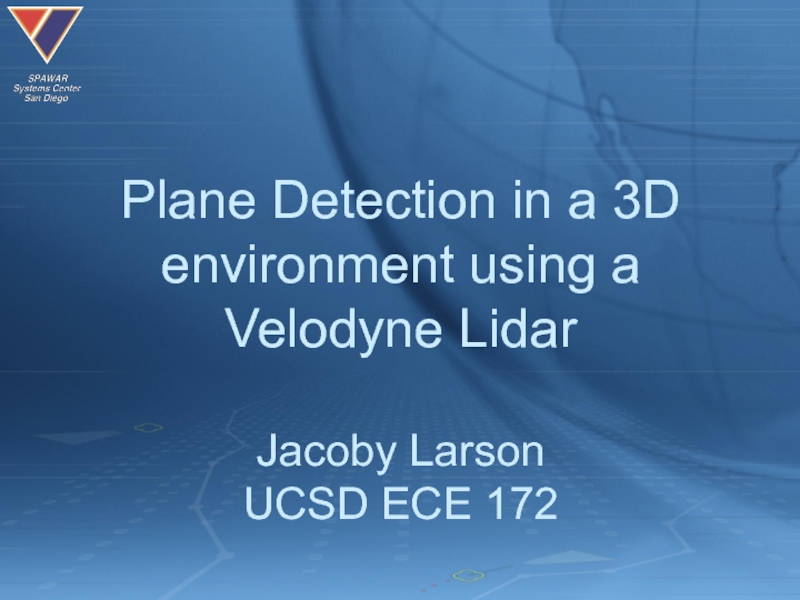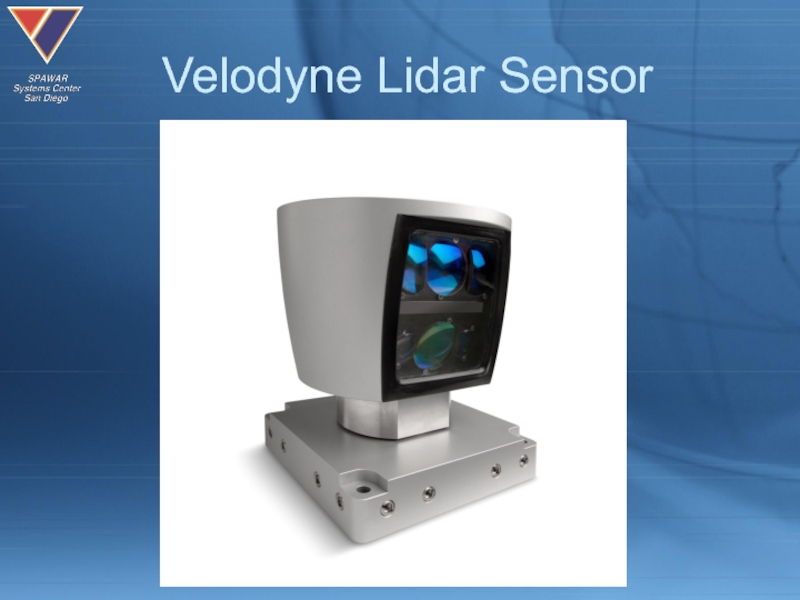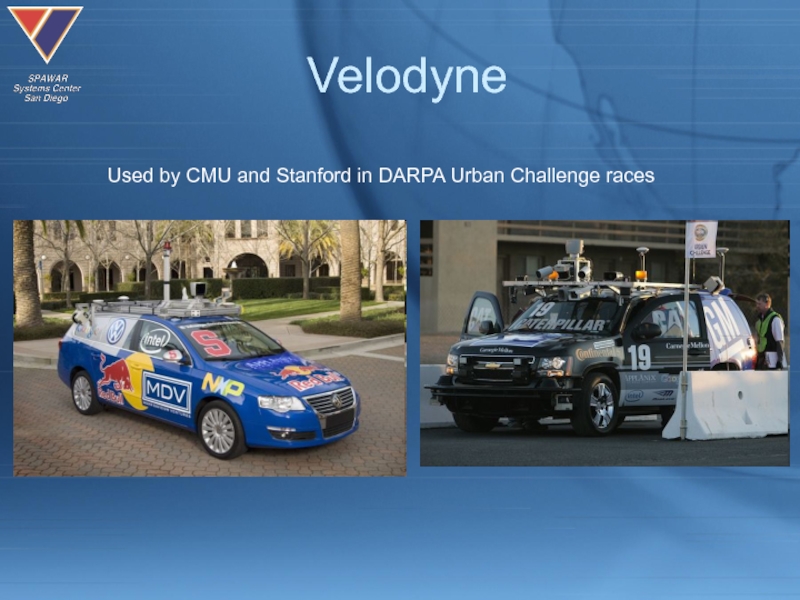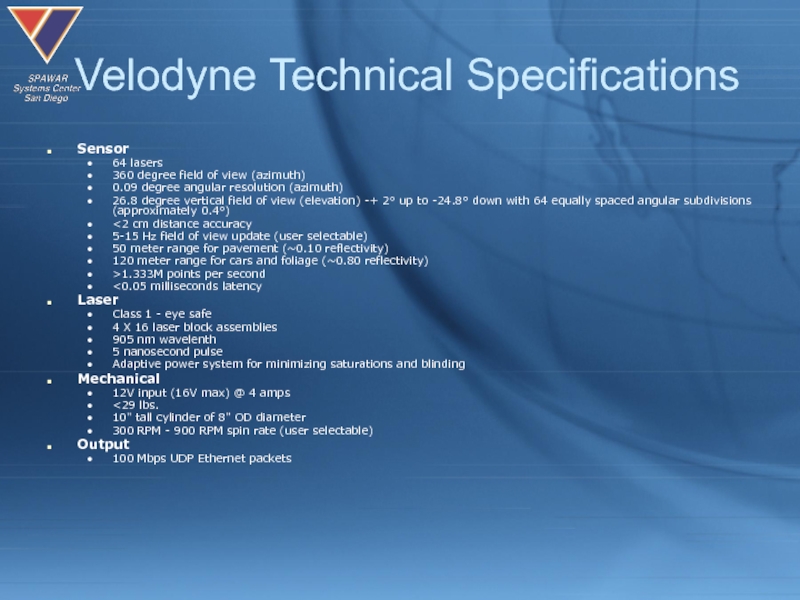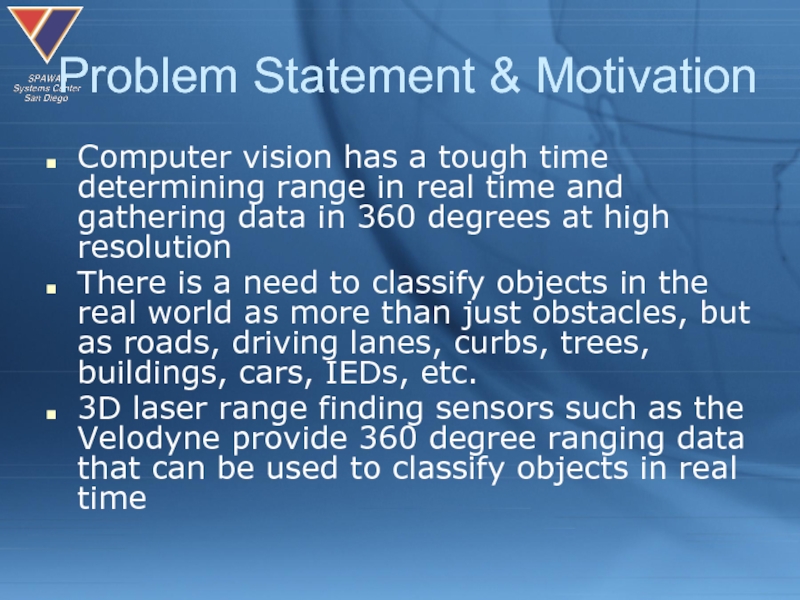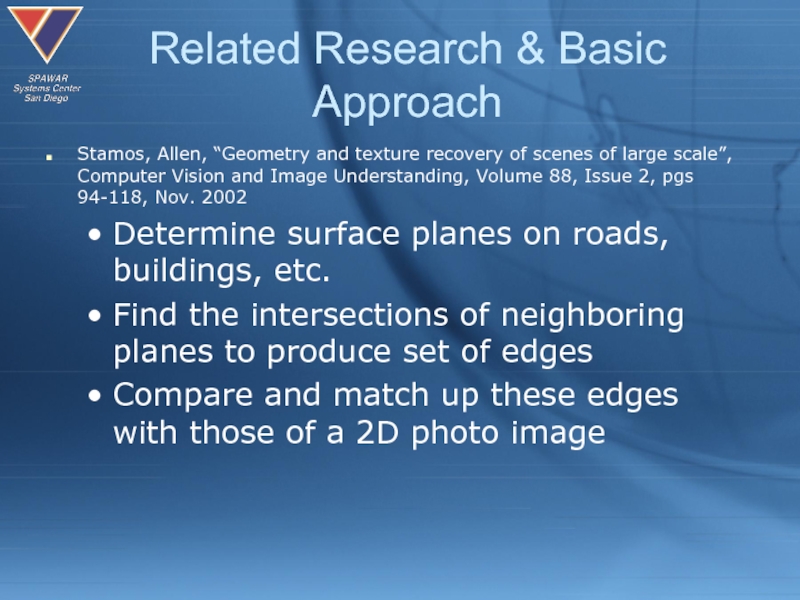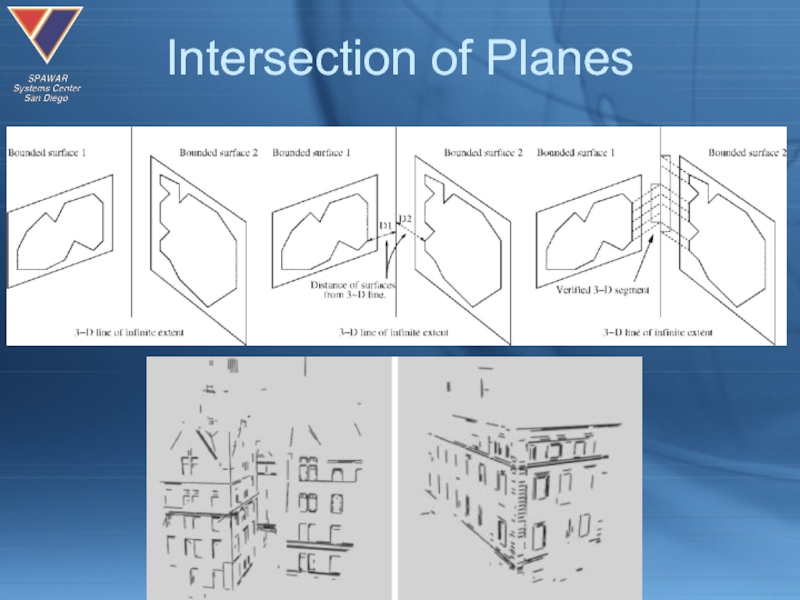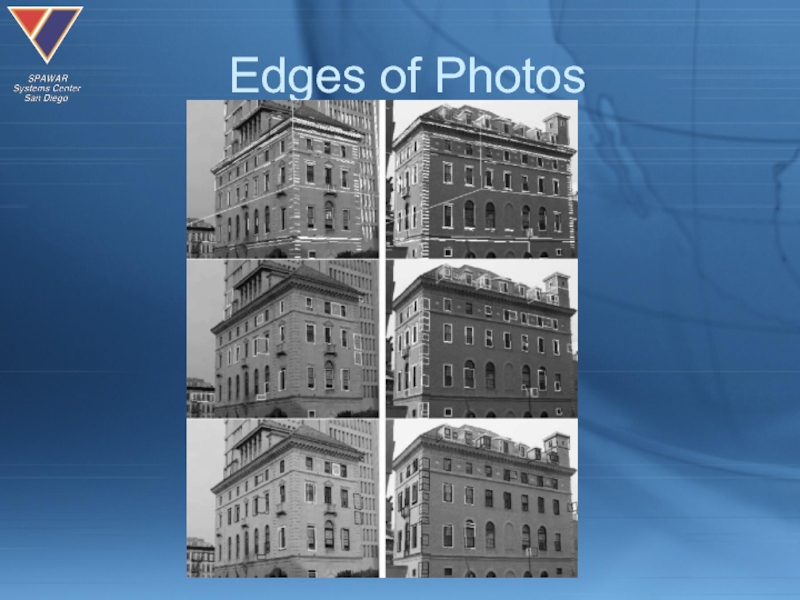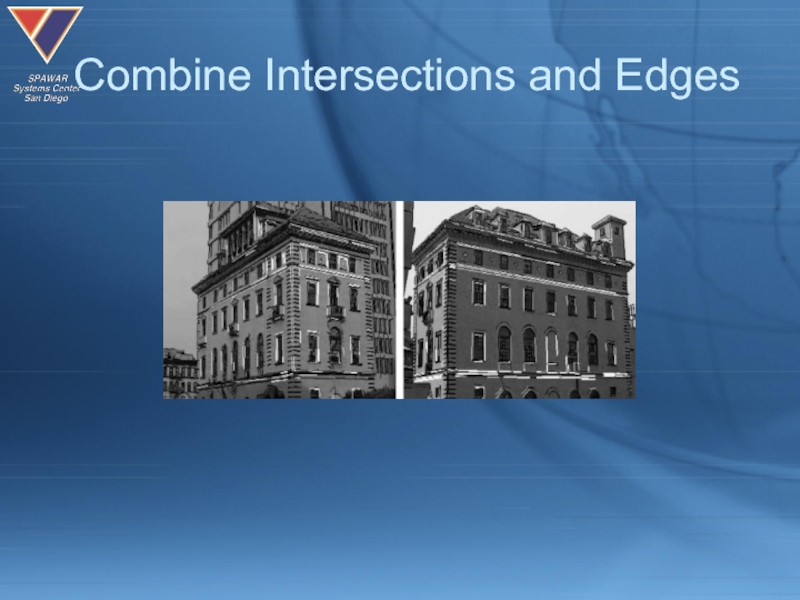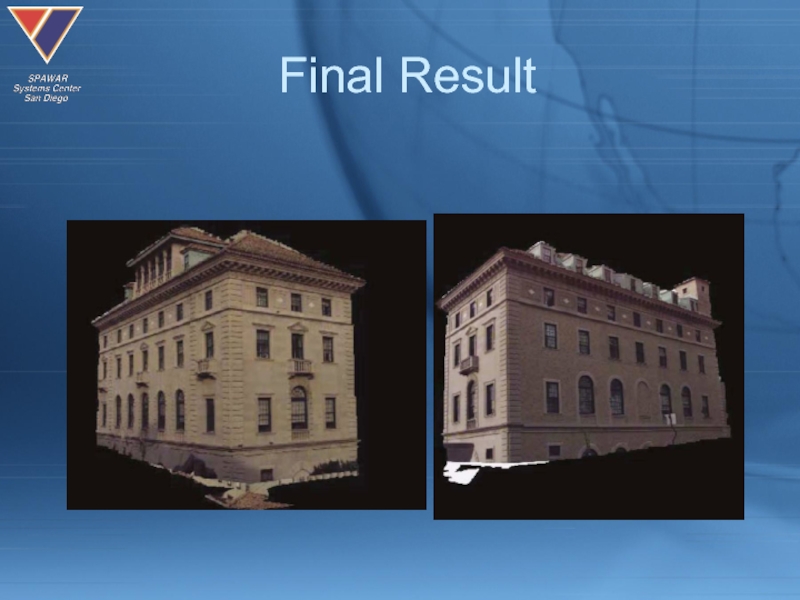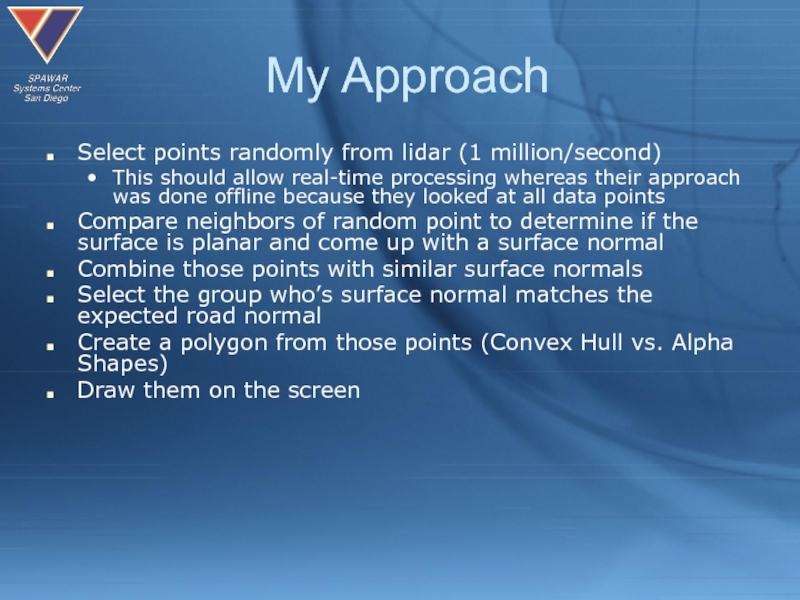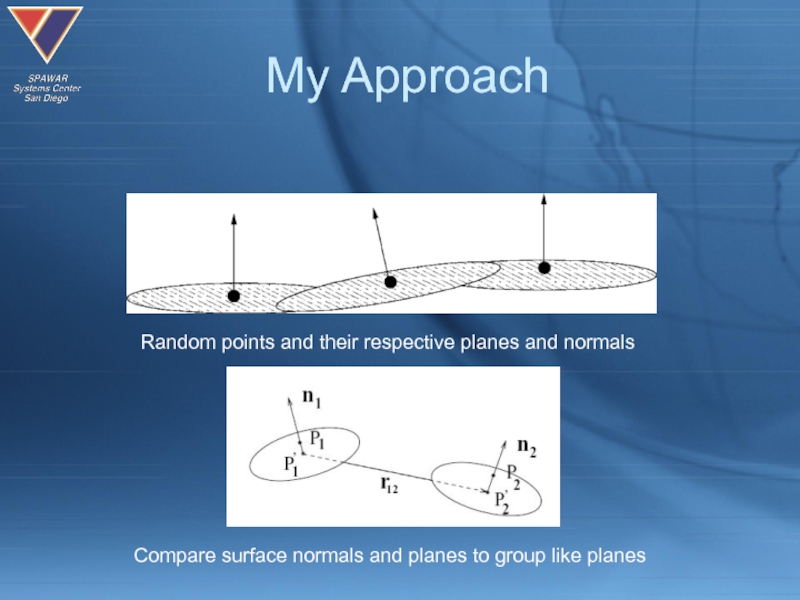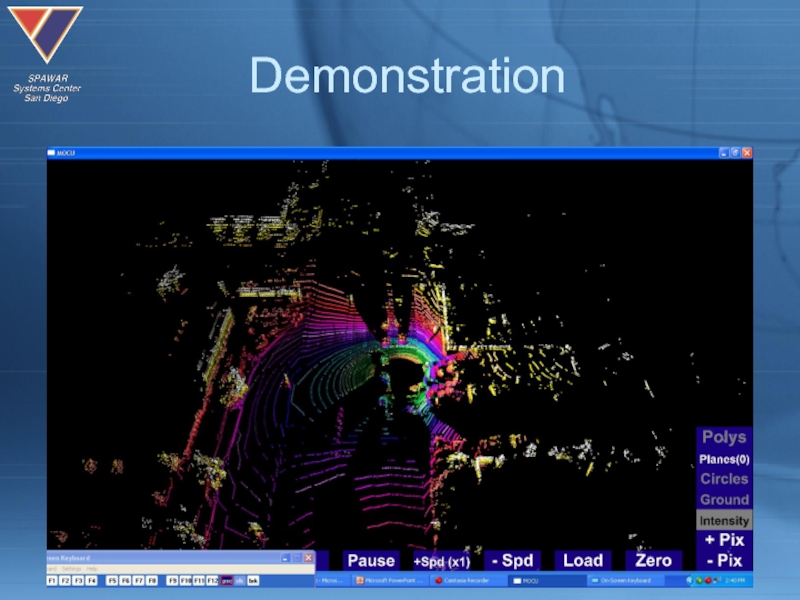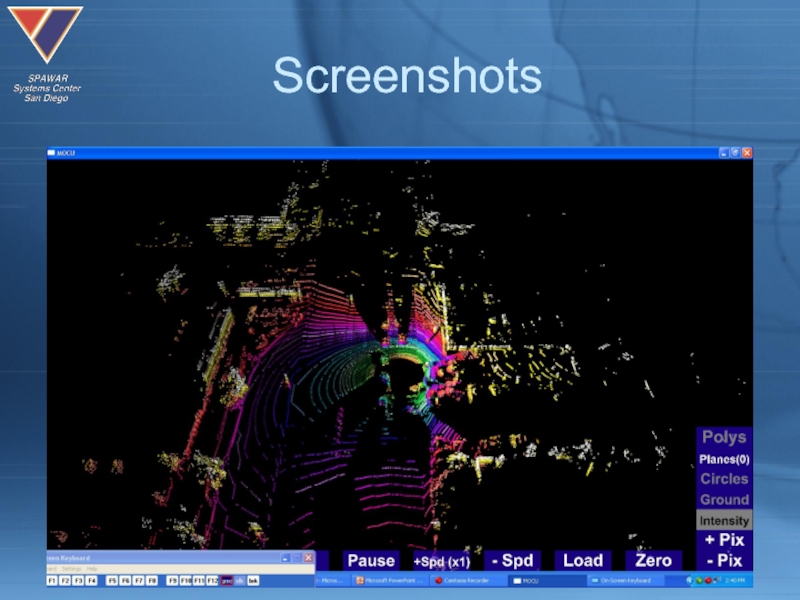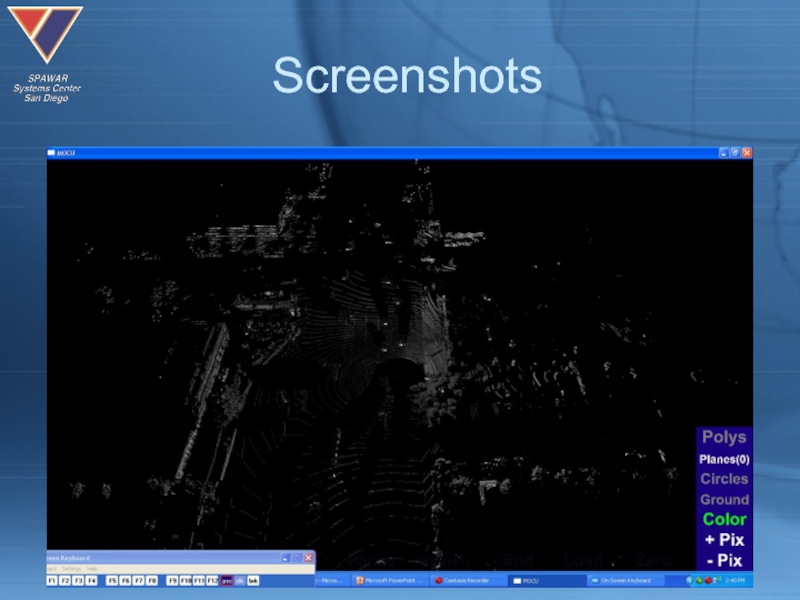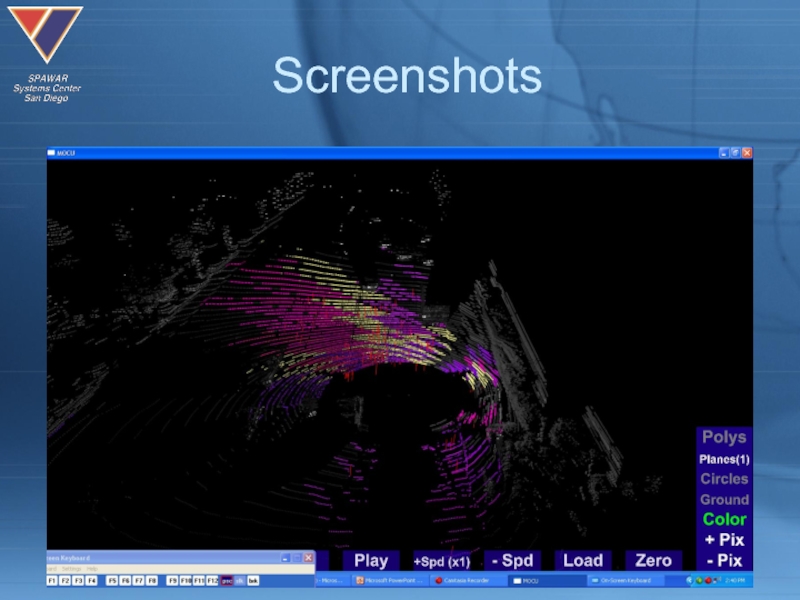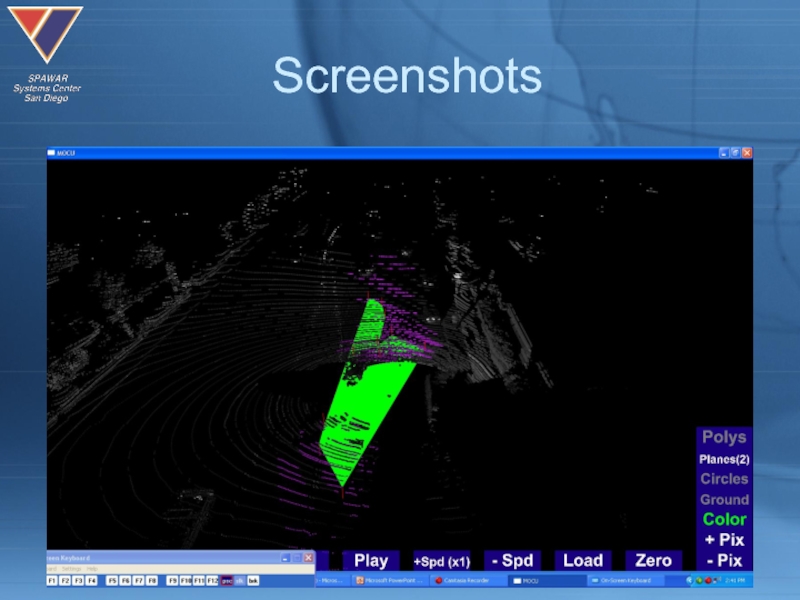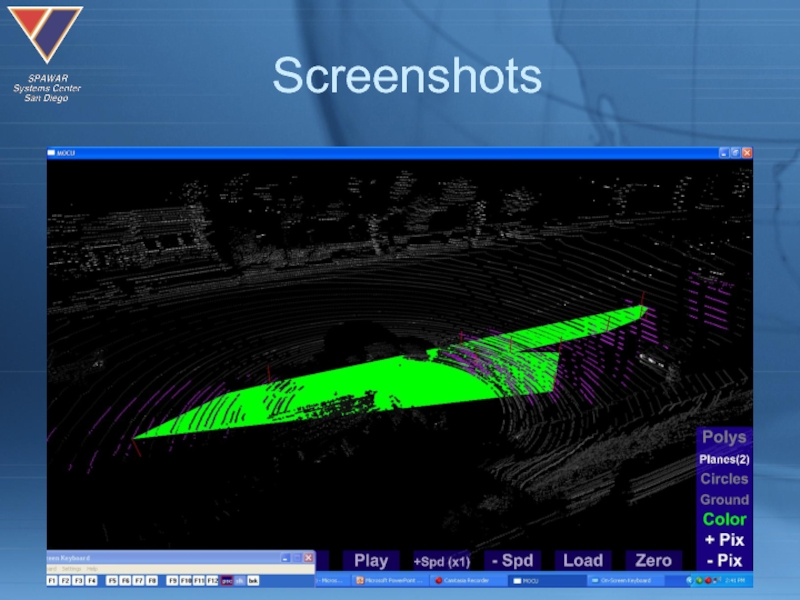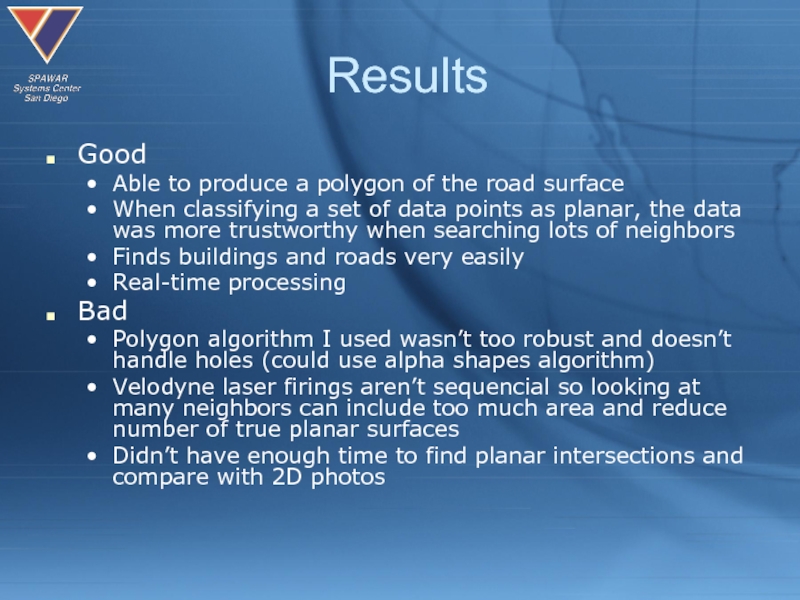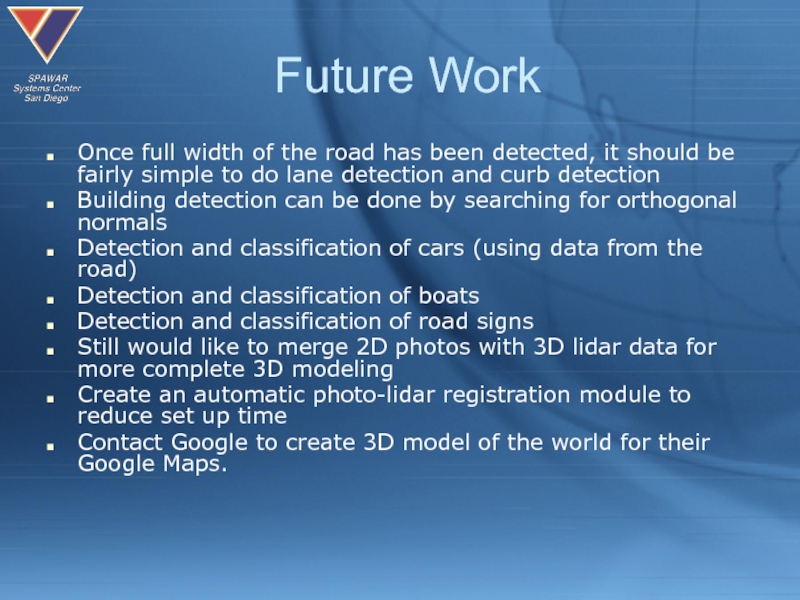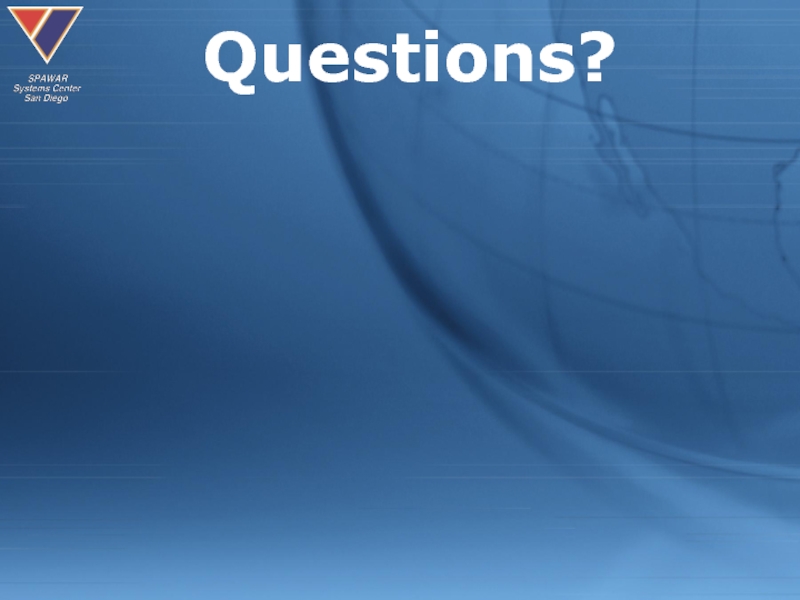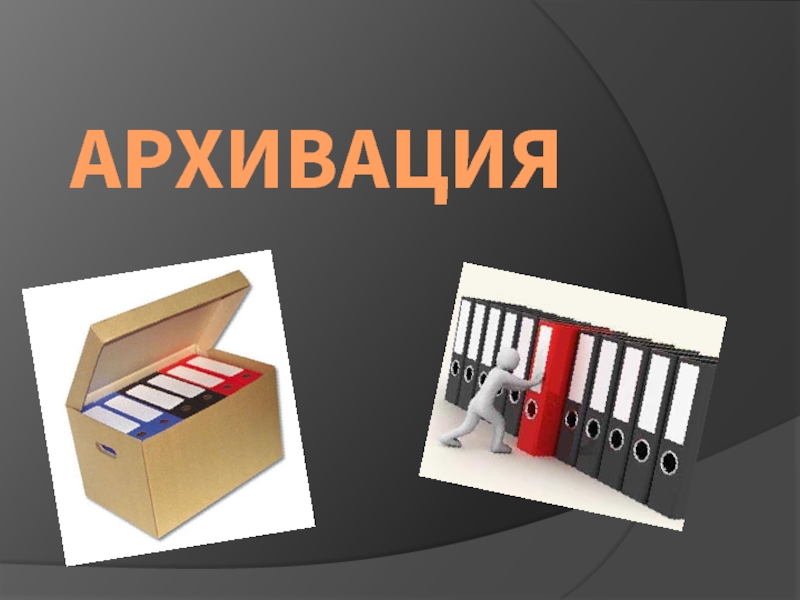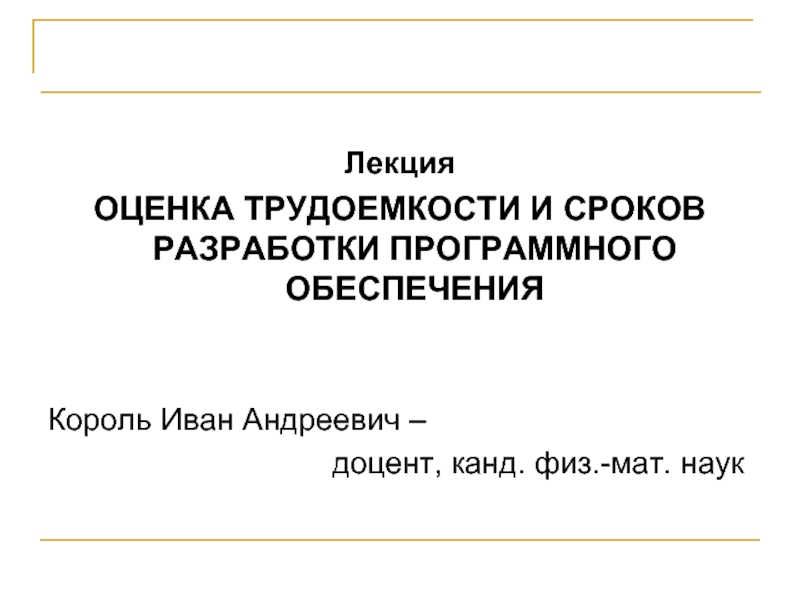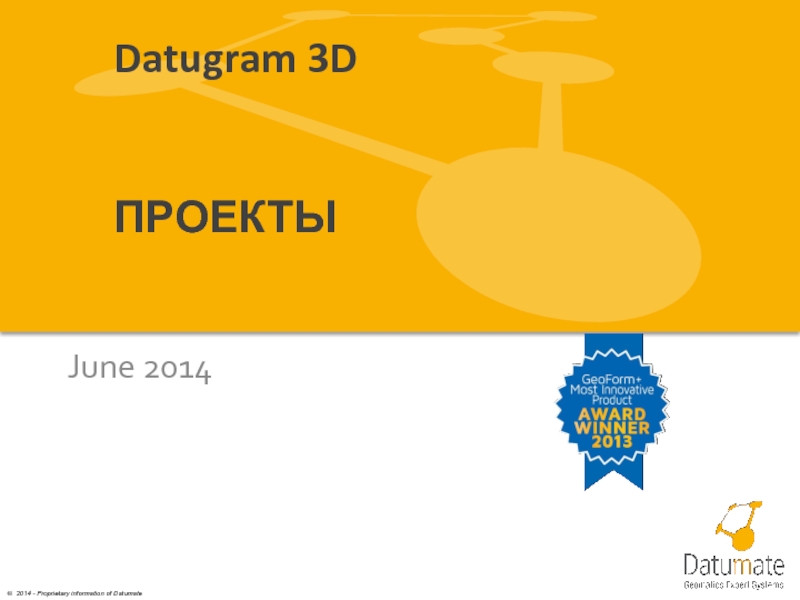ECE 172
- Главная
- Разное
- Дизайн
- Бизнес и предпринимательство
- Аналитика
- Образование
- Развлечения
- Красота и здоровье
- Финансы
- Государство
- Путешествия
- Спорт
- Недвижимость
- Армия
- Графика
- Культурология
- Еда и кулинария
- Лингвистика
- Английский язык
- Астрономия
- Алгебра
- Биология
- География
- Детские презентации
- Информатика
- История
- Литература
- Маркетинг
- Математика
- Медицина
- Менеджмент
- Музыка
- МХК
- Немецкий язык
- ОБЖ
- Обществознание
- Окружающий мир
- Педагогика
- Русский язык
- Технология
- Физика
- Философия
- Химия
- Шаблоны, картинки для презентаций
- Экология
- Экономика
- Юриспруденция
Plane Detection in a 3D environment using a Velodyne Lidar Jacoby Larson UCSD ECE 172 презентация
Содержание
- 1. Plane Detection in a 3D environment using a Velodyne Lidar Jacoby Larson UCSD ECE 172
- 2. Velodyne Lidar Sensor
- 3. Velodyne Used by CMU and Stanford in DARPA Urban Challenge races
- 4. Velodyne Technical Specifications Sensor 64 lasers
- 5. Problem Statement & Motivation Computer vision has
- 6. Related Research & Basic Approach Stamos, Allen,
- 7. Intersection of Planes
- 8. Edges of Photos
- 9. Combine Intersections and Edges
- 10. Final Result
- 11. My Approach Select points randomly from lidar
- 12. My Approach Random points and their respective
- 13. Demonstration
- 14. Screenshots
- 15. Screenshots
- 16. Screenshots
- 17. Screenshots
- 18. Screenshots
- 19. Results Good Able to produce a polygon
- 20. Future Work Once full width of the
- 21. Questions?
Слайд 4Velodyne Technical Specifications
Sensor
64 lasers
360 degree field of view (azimuth)
0.09 degree angular resolution (azimuth)
26.8 degree vertical field of view (elevation) -+ 2° up to -24.8° down with 64 equally spaced angular subdivisions (approximately 0.4°)
<2 cm distance accuracy
5-15 Hz field of view update (user selectable)
50 meter range for pavement (~0.10 reflectivity)
120 meter range for cars and foliage (~0.80 reflectivity)
>1.333M points per second
<0.05 milliseconds latency
Laser
Class 1 - eye safe
4 X 16 laser block assemblies
905 nm wavelenth
5 nanosecond pulse
Adaptive power system for minimizing saturations and blinding
Mechanical
12V input (16V max) @ 4 amps
<29 lbs.
10" tall cylinder of 8" OD diameter
300 RPM - 900 RPM spin rate (user selectable)
Output
100 Mbps UDP Ethernet packets
Слайд 5Problem Statement & Motivation
Computer vision has a tough time determining range
in real time and gathering data in 360 degrees at high resolution
There is a need to classify objects in the real world as more than just obstacles, but as roads, driving lanes, curbs, trees, buildings, cars, IEDs, etc.
3D laser range finding sensors such as the Velodyne provide 360 degree ranging data that can be used to classify objects in real time
There is a need to classify objects in the real world as more than just obstacles, but as roads, driving lanes, curbs, trees, buildings, cars, IEDs, etc.
3D laser range finding sensors such as the Velodyne provide 360 degree ranging data that can be used to classify objects in real time
Слайд 6Related Research & Basic Approach
Stamos, Allen, “Geometry and texture recovery of
scenes of large scale”, Computer Vision and Image Understanding, Volume 88, Issue 2, pgs 94-118, Nov. 2002
Determine surface planes on roads, buildings, etc.
Find the intersections of neighboring planes to produce set of edges
Compare and match up these edges with those of a 2D photo image
Determine surface planes on roads, buildings, etc.
Find the intersections of neighboring planes to produce set of edges
Compare and match up these edges with those of a 2D photo image
Слайд 11My Approach
Select points randomly from lidar (1 million/second)
This should allow real-time
processing whereas their approach was done offline because they looked at all data points
Compare neighbors of random point to determine if the surface is planar and come up with a surface normal
Combine those points with similar surface normals
Select the group who’s surface normal matches the expected road normal
Create a polygon from those points (Convex Hull vs. Alpha Shapes)
Draw them on the screen
Compare neighbors of random point to determine if the surface is planar and come up with a surface normal
Combine those points with similar surface normals
Select the group who’s surface normal matches the expected road normal
Create a polygon from those points (Convex Hull vs. Alpha Shapes)
Draw them on the screen
Слайд 12My Approach
Random points and their respective planes and normals
Compare surface normals
and planes to group like planes
Слайд 19Results
Good
Able to produce a polygon of the road surface
When classifying a
set of data points as planar, the data was more trustworthy when searching lots of neighbors
Finds buildings and roads very easily
Real-time processing
Bad
Polygon algorithm I used wasn’t too robust and doesn’t handle holes (could use alpha shapes algorithm)
Velodyne laser firings aren’t sequencial so looking at many neighbors can include too much area and reduce number of true planar surfaces
Didn’t have enough time to find planar intersections and compare with 2D photos
Finds buildings and roads very easily
Real-time processing
Bad
Polygon algorithm I used wasn’t too robust and doesn’t handle holes (could use alpha shapes algorithm)
Velodyne laser firings aren’t sequencial so looking at many neighbors can include too much area and reduce number of true planar surfaces
Didn’t have enough time to find planar intersections and compare with 2D photos
Слайд 20Future Work
Once full width of the road has been detected, it
should be fairly simple to do lane detection and curb detection
Building detection can be done by searching for orthogonal normals
Detection and classification of cars (using data from the road)
Detection and classification of boats
Detection and classification of road signs
Still would like to merge 2D photos with 3D lidar data for more complete 3D modeling
Create an automatic photo-lidar registration module to reduce set up time
Contact Google to create 3D model of the world for their Google Maps.
Building detection can be done by searching for orthogonal normals
Detection and classification of cars (using data from the road)
Detection and classification of boats
Detection and classification of road signs
Still would like to merge 2D photos with 3D lidar data for more complete 3D modeling
Create an automatic photo-lidar registration module to reduce set up time
Contact Google to create 3D model of the world for their Google Maps.
